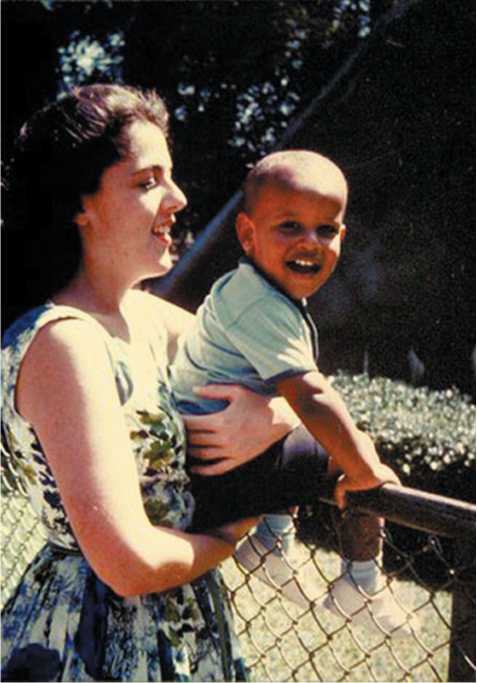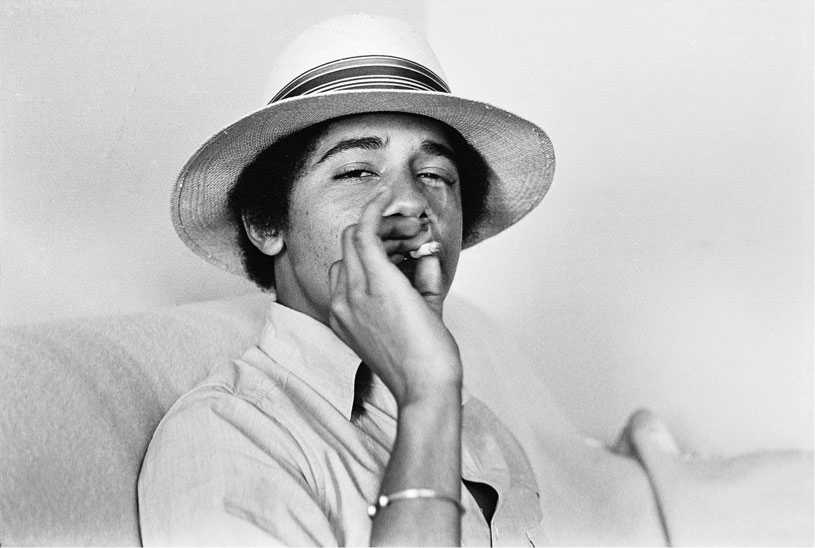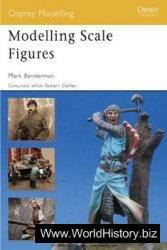Not many thirty-three-year-olds write a memoir. But Barack Obama, who intended to write a book on race relations, instead explored the meaning of his young life.
The facts were clear enough. He was born on August 4,1961,in Honolulu, Hawaii. His mother was Stanley (Ann) Dunham, whom a friend described as "Kansas white." His father, Barack Obama, Sr., was a Luo tribesman from Nyanza Province, Kenya who had come to the University of Hawaii on a program to educate potential leaders of newly independent African nations. The couple had met in a Russian-language course at the university the previous year. Within a few months, Dunham was pregnant. Obama told her that he had been married in Kenya but had since divorced. Ann and Obama married in February, 1961. She was eighteen when she had Barack, Jr.
Her husband, however, had lied. Not only was he still married to a Kenyan, but he had one son by her with another

Stanley (Ann) Dunham with her son, Barack Obama, age two.
On the way. In 1962,after graduating from Hawaii, he went to Harvard to pursue a graduate degree, leaving Ann and their son in Hawaii. When she went to visit him at Harvard, she brought the infant along. The trip went badly. Her husband had not told his friends about her or his wife in Kenya. Ann returned to Hawaii; it would be another ten years before she or her son saw his father again.
Ann and her son moved into her parents'two-bedroom apartment in Honolulu. She returned to college and her parents often took care of the boy, whom everyone called Barry. Several years later Ann divorced Obama—by then he had taken yet another wife—and she married an Indonesian geologist at the University of Hawaii. In 1967, Ann, her new husband and six-year-old Barry moved to the outskirts of Jakarta, Indonesia, where the family lived in a stucco house on a dirt lane. Chickens and ducks ran around the backyard and two crocodiles lived in a fenced-in pond on the property. Obama's mother had always encouraged her son to adapt to different peoples, but soon her thinking shifted.
Now she realized the vast chasm separating the prospects of young people who grew up in Indonesia compared to the United States.
She enrolled in a correspondence course for elementary school children in the United States. At four each morning, she awakened Barry and together they worked through the materials. After he had completed fourth grade in Jakarta, she sent him to Honolulu to live with her parents, promising to follow within a year.
Barry's grandfather arranged for the boy to attend the elite Punahou Academy. He was one of the few African Americans in the school. When some boys teased him about living in the jungle, he invented stories about how his father was a warrior and an African prince. Obama nearly persuaded himself that this fiction was true.
When his father showed up in Honolulu for a monthlong visit, Barry was appalled. What would he tell his friends? But he was also confused. His long-absent father proceeded to boss Ann and her parents and demanded that Barry work harder in school. When Barry's teacher invited his father to give a lecture on Africa, Barry was mortified. But his father's talk was smooth and gripping. Barry's friends were impressed. His father left soon afterwards. Barry never saw him again.
As a teenager, Barry excelled at basketball; his senior year, he was on the Punahou team that won the state championship. He also wrote poetry. But he lacked motivation and managed only a B - average as a senior. He spent most of his time hanging out with slacker friends. Privately, he brooded over his father's estrangement. He coped with doubts about himself by using marijuana, booze, and cocaine. When one of his friends was busted for drug possession, Obama knew it could have been him.

Obama at Occidental College in 1980.
His first two years at Occidental College in California were more of the same. He did little work. He was nevertheless popular with nearly everyone, navigating among different social groups with ease."He was a hot, nice, everything-going-for-him dude,"one friend recalled."You couldn't help but like him." But issues of race weighed upon him and his black friends. After some of them teased him for using the name Barry, he began to ask people to call him Barack.
After his sophomore year, Obama transferred to Columbia University in New York. Denied campus housing as a transfer student, he lived in cheap apartments in Harlem. Then something changed. He studied, ran three miles a day, often fasted on Sundays, gave up drinking and drugs (cigarettes proved more difficult),and kept a journal to record his thoughts and poetry.
Late in the fall of his senior year, he received a phone call from Africa. His father was dead. He had been drunk and drove his car into the stump of a gum tree. Even in death, his father remained a mystery to Obama.
Obama later dreamt that he was on a long bus ride that ended up at a jail. He went in and saw his father in a cell, naked but for a cloth around his waist. As Obama entered the cell, his father teased him for being so thin. Obama embraced him and wept. His father then said that he had always loved his son. Barack suggested that his father accompany him from jail; but his father replied that it would be best if the boy left alone.
When Obama awakened, he was crying.
Perhaps young Barack had at last reconciled with his absent father, enabling him to march toward his destiny with the singular purposefulness that became his trademark. Or
Perhaps he sensed that he would have to create a meaningful life through achievement of his own.
Whatever the reason, he did achieve. In 1985,after graduating from Columbia, he took a job as a community organizer in Chicago and established job training programs in schools, fought to remove asbestos in housing projects, and campaigned against drug dealers. Then he was admitted to Harvard Law School, named to the Harvard Law Review, and elected its president, the first black to hold this prestigious position. Afterwards he returned to Chicago to write a book; it became Dreams from My Father (1995),a memoir from which much of this account is taken. (The publisher has refused permission for any quotes from that book to appear in this one.) He taught constitutional law at the University of Chicago while working for a black law firm with strong connections to Chicago politics. In 1996 he ran for the Illinois state legislature and won. It was the beginning of a meteoric ascent in American politics that culminated in Obama's election as president in 2008.




 World History
World History





![Road to Huertgen Forest In Hell [Illustrated Edition]](https://www.worldhistory.biz/uploads/posts/2015-05/1432477693_1428700369_00344902_medium.jpeg)



